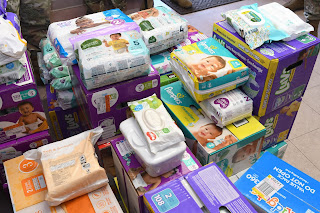Every baby needs best baby diapers. Unfortunately
your baby will probably go through anywhere from 6-10 diapers daily.
However, this is an essential baby product that no parent can live
without. Deciding which diaper to choose can be difficult. Making the
wrong decision can cause lots of headaches, and messes. Check out our
reviews on various diapers, disposable and cloth, and decide for
yourself which diaper is right for your lifestyle and for your baby.
But, most parents do use disposable diapers due to their convenience (you don’t have to wash after use—just throw away) and due to their high level of absorbency and ability to prevent leaks. Even many environmentally consciousness parents who use cloth diapers will switch to disposable diapers during the night for peace of mind and to prevent nighttime leaks.
For parents who really want to use disposable diapers but feel guilty about the effects of their use on the environment, there are some more ecological disposable diapers on the market now that are made with biodegradable shells and that are produced without chlorine or other added chemicals. Check out the various reviews and see what’s available.
Cloth diapers have come a long way over the past few decades are no longer the flimsy cotton clothes held together with safety pins that our mothers and grandmothers use to use. Today, many cloth diapers actually resemble disposable diapers and even have the absorbency level of some of the top disposable diapers. However, you still need to wash a disposable diaper after every use. But, you can avoid having to soak cloth diapers before washing by using special cloth inserts that, when soiled, you can just throw away or flush down the toilet. This makes using cloth diapers that much easier. Most cloth diapers also now come with water-proof covers that help prevent any dreadful leaks. Find out more about the various options for cloth diapers.
Disposable Diapers
Disposable diapers are diapers you can throw away after they have been soiled. This is the easiest kind of diaper to use, especially for busy parents. However, disposable diapers are not very biodegradable and are considered environmentally unfriendly. They are also very expensive and the cost after at least two years of use can be high. |
| Best Baby Diapers |
But, most parents do use disposable diapers due to their convenience (you don’t have to wash after use—just throw away) and due to their high level of absorbency and ability to prevent leaks. Even many environmentally consciousness parents who use cloth diapers will switch to disposable diapers during the night for peace of mind and to prevent nighttime leaks.
For parents who really want to use disposable diapers but feel guilty about the effects of their use on the environment, there are some more ecological disposable diapers on the market now that are made with biodegradable shells and that are produced without chlorine or other added chemicals. Check out the various reviews and see what’s available.
Cloth Diapers
Cloth diapers are more ecological than disposable diapers and also help to prevent diaper rash. They are also cheaper to use than disposable diapers. You will initially spend some money buying enough cloth diapers to get you started. But then, because your wash and reuse the cloth diapers, you will not have to continuously purchase diapers like you do with disposable diapers.Cloth diapers have come a long way over the past few decades are no longer the flimsy cotton clothes held together with safety pins that our mothers and grandmothers use to use. Today, many cloth diapers actually resemble disposable diapers and even have the absorbency level of some of the top disposable diapers. However, you still need to wash a disposable diaper after every use. But, you can avoid having to soak cloth diapers before washing by using special cloth inserts that, when soiled, you can just throw away or flush down the toilet. This makes using cloth diapers that much easier. Most cloth diapers also now come with water-proof covers that help prevent any dreadful leaks. Find out more about the various options for cloth diapers.










0 comments:
Post a Comment